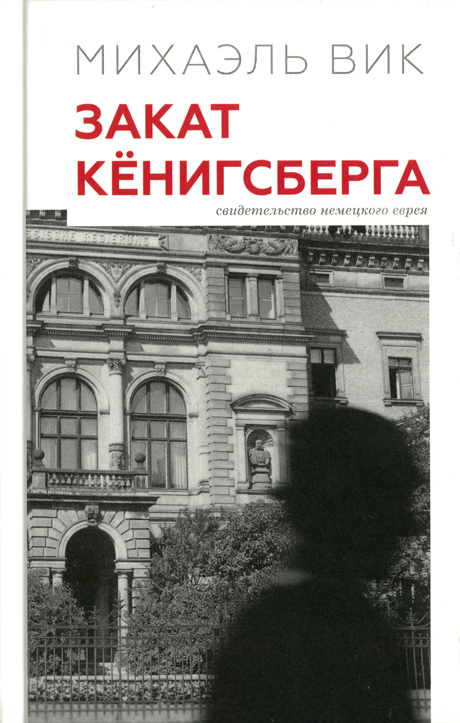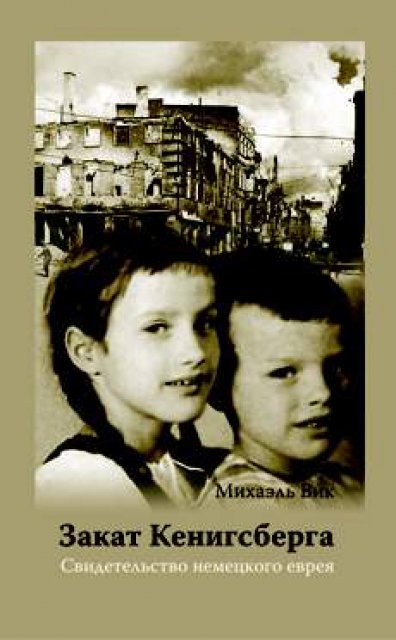
»Михаэль Вик выжил дважды: в Кёнигсберге во время и после Второй мировой войны. Для нацистов он был немецким юношей еврейского происхождения, для советских военных — просто немецким юношей, а значит, в обоих случаях лишним. Михаэль испытал на себе ненависть и жестокость; взрослел, находя убежище в детских воспоминаниях, игре на скрипке и чтении философских книг. В 1948 году с семьей уехал в Берлин. Стал профессиональным скрипачом. В 1980е написал «Закат Кёнигсберга» — не дневник, не воспоминания, а именно свидетельство, где нет врагов и союзников; вместо них — память и рассудительность.«
(исто́чник: Дизайн-бюро «Пикторика»)
Взгляд Михаэля Вика (1928 г. р.) на описываемые им события уникален: зверства нацистов увидены глазами подростка с желтой звездой, а британские бомбардировки и русская оккупаця – глазами жителя уничтоженного Кёнигсберга. В стане гонимых Вик оказался и как еврей, и как немец, и в этом секрет его необыкновенной зокрости и свободы от любых идеологических шор, Мемуары Вика переиздавались в Германи 7 раз с 1988 года. В 2003 году они вышли в переводе на английский.
Michael Wieck beschreibt in Zeugnis vom Untergang Königsbergs seine Jugend im nationalsozialistischen Königsberg, wo er als Halbjude Verfolgungen und Schikanen ausgesetzt war und schließlich Zerstörung sowie russische Besetzung der ostpreußischen Stadt erlebte.

Eine Rezension der englischen Ausgabe:
WASHINGTON TIMES
November 30, 2003
Washington, DC
WIECK, MICHAEL
A Childhood Under Hitler and StalinCold War, Wall Street, persecution
On a more somber note, just when you thought you had read the most harrowing Holocaust survivor's memoir, another comes along which surpasses it. A Childhood under Hitler and Stalin: Memoirs of a »Certified Jew« by Michael Wieck (University of Wisconsin, $19.95, 293 pages), a bestseller in Germany and now beautifully translated by Penny Milbouer, is an eyewitness account of what happened to a young boy of mixed parentage (Jewish mother, Gentile father) in the East Prussian town of Koenigsberg. Obliterated by Allied fire-bombing during World War II, Koenigsberg, once the home of Immanuel Kant, was annexed by Moscow in 1945. It is today a Russian city called Kaliningrad, an ice-free port on the Baltic, geographically separated from the Russian border but an unshakeable part of the Russian Federation.
Mr. Wieck's tragedy was double that of the ordinary victim. He was persecuted first by the Nazis as a »certified Jew« and then as a German by the Russian occupiers who took over in victory. As a child Mr. Wieck, now. 75 and a retired musician in Stuttgart, wore the Star of David and saw his aunts deported to the death camps. Yet on his father's side of the family were Wehrmacbt officers and even a dinner companion of Hitler.
What is unusual about this memoir is its account of the aftermath of the war, of what it was like to be 17 in post- war Soviet-occupied Koenigsberg when cannibalism became a way of life and rotten potatoes a gift from heaven. The Red Army was out to make the Germans pay, and pay they did. It's a fascinating memoir — but not for the squeamish.
Arnold Beichman, a Hoover Institution research fellow, is a columnist for The Washington Times.